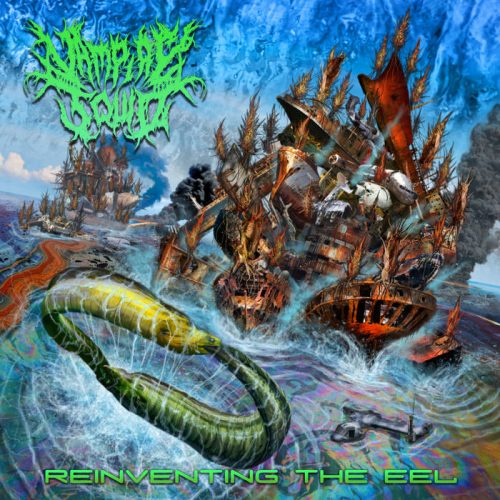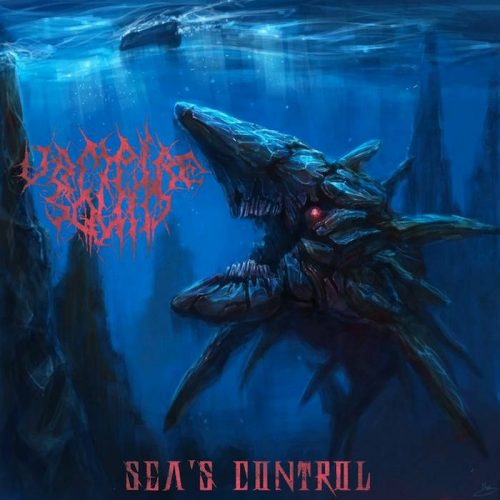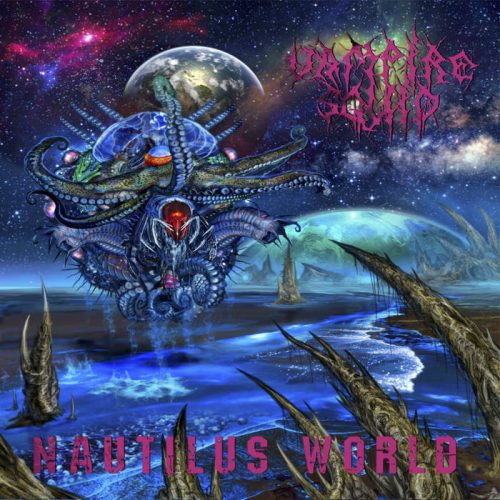
(This is Andy Synn‘s SYNN REPORT for November 2020, and this month he lines up reviews of all the albums by California’s Vampire Squid.)
Recommended for fans of: Cattle Decapitation, The Red Chord, Slugdge
Being in a Metal band and not taking yourself too seriously, while also treating your craft and your audience with the respect they deserve, is a difficult line to walk – but not an impossible one.
Matter of fact, some of my favourite bands are dead serious (and highly professional) about what they do while also being fully aware of the innate absurdity of using the medium of Metal to bellow barely decipherable lyrics about historical atrocities or struggles with mental illness or scorn for global politics… or any one of a hundred other deadly serious, and seriously dark, issues.
And while lyrically Southern California Tech-Grind crew Vampire Squid may be slightly less serious than some – most of their songs are based around the classic Death Metal themes of blood, guts, and dismemberment, albeit with a suitably briny twist – musically speaking they’re cut from the same creative cloth as bands like The Red Chord and The Faceless, marrying the angular technicality of these groups with a rabid intensity reminiscent of Cattle Decapitation and Benighted, all topped off with a dose of the complex-yet-catchy songwriting style of their mollusc-based brethren in Slugdge (with whom they also share a love for pun-tastic song titles).
But, hey, if all that sounds too good to be true then why not see/hear for yourself and join me on a free dive into the crushing depths of the band’s discography for this month’s edition of The Synn Report?

VAMPIRE SQUID – 2013
The band’s self-titled debut begins with its tongue planted firmly in its cheek during the purposefully/patently ridiculous intro of “We Are The Vampire Squid”, but that tongue is soon busy bellowing a series of ragged gutturals over the madcap blend of twitchy Mathcore, bruising Grind, and chunky, give-no-fucks Death Metal that makes up “The Bends”, after which the rapid-fire riffs and discordant drums of early highlight “Flying Fish Hooks” give you your first insight into the band’s still evolving potential.
The lurching, spasming, blast-infused strains of “Where Is Your Cod Now?” may be a little ADD for some of our readers, but they definitely showcase the band’s willingness to detour around common convention, while the atonal, uber-aggressive assault of “Licensed to Krill” gives you a glimpse of the group at their gnarliest, equal parts Car Bomb-influenced chaos and Suffocation-inspired savagery.
“Keep on Finning” doubles down on this Suffo-style Death/Tech/Core mash-up, while also adding a dash of progged-up fretwork and the occasional burst of mangled melody for extra flavour, after which “Bullshark Rodeo” triples down, hard, with its gargantuan Death Metal grooves and chunky, chugging riffs – only to suddenly go all Frank Zappa for almost a full minute right in the middle.
It’s “20,000 Leagues Under the Squee” (I know, I know) where you really start to see the band beginning to harness their full potential though, beginning to look beyond just “what the hell is the next riff going to be” and actually starting to develop a real sense of direction and identity.
Of course the song is still kind of all over the place – going from a surprisingly atmospheric, deathly opening passage to an even more brutal section of hammering Death-meets-’Core crushery, then to a touch of malevolent Prog-Death and then to a full on Tech/Prog freak-out, before finishing with one of the best, and catchiest riffs on the entire record – but it’s here that you really start to see all the pieces falling into place.
Concluding with the jerky, electro-convulsive riffs of “Jellyfish Defibrillator” and the crushing Progressive Death Grind of “Somebody Please Kelp Me” (another big highlight of the record), Vampire Squid’s first album may be a little rough around the gills (especially when compared to the records which followed it) but it’s still a fascinating glimpse into the early stages of the band’s evolution, and well worth a listen.

SEA’S CONTROL – 2013
Less than six months after the release of their self-titled debut Vampire Squid were back with their much-improved sophomore album, Sea’s Control. And while the puns may not have gotten any better, the playing (and the writing) certainly have, something which becomes immediately apparent when the massive opening riff of “Mussell Beach” finally kicks in.
Everything (especially the bass) just sounds that much tighter, sharper, and beefier, and the transitions – while still coming thick and fast – see the band shifting gear more smoothly, moving from deathly grooves to blasting grind to jazzy proggery to slippery tech to crushing ‘core, with barely a hitch in their step or a hint of hesitation.
“Squishy Slimy Slippy” would probably be considered downright catchy if it weren’t so damnably off-kilter and aggressive, and it’s this mix of unorthodox hooks and unpredictable songwriting that really hammers home the similarities – both sonic and spiritual – to bands like The Red Chord and Cephalic Carnage, who never heard a melody they didn’t want to mangle, or a hooky riff that they didn’t feel compelled to cut-and-paste into a strange new shape.
“Oh the Clamity” might just be the best song the band have written (so far, anyway), as it possesses a striking sense of focus – riff after riff after riff just pounding into your brain – as well as an increased level of aggression (particularly vocally) that just seems to hit that little harder, while the splashes of bio-luminescent melody (which appear part-way through) and the inky shroud of atmosphere (which coats the song’s crushing finale) are a significant step up for the group in all aspects.
The three-part title-track gives the band a little more room to spread out their influences a bit more, with part one, “Bow Before Me”, marrying an almost djentrified bounce to a barrage of Death-Grind belligerence, while part two, “Mutiny”, goes for a crunchier, chunkier Deathcore-friendly approach, and part three, “Broken Stern’m”, pivots towards more of a Prog/Tech Death sound with hints of The Faceless beginning to seep in through the cracks in the hull.
These last two tracks happen to also be two of the best on the album, although both “Tenticular Cancer” and “Slam Chowder” then up the ante even more in a devastating display of proggy Death Metal-meets-Deathcore-meets-Tech Death punishment.
Closing out with the chaotic Math-Grind of “Life Without Porpoise” and the utterly humongous “Stargazer” (think early The Faceless but somehow even heavier), Sea’s Control is abject proof that Vampire Squid are the real fucking deal… and evidence as to why you should keep reading to learn how they get even better.

NAUTILUS WORLD – 2014
The next stage of the band’s evolution found them developing a bigger, more bombastic sound, that achieved a greater level of hookiness without sacrificing an ounce of heaviness.
Just check out the driving, bio-organic riffs and swirling melodies of the title-track – whose more streamlined and straight-to-the-throat songwriting still incorporates a veritable host of Death Metal, Deathcore, Tech and Prog elements – or the visceral blend of chest-bursting brutality and spine-chilling atmosphere that makes up the bi-polar perversion of “Deathstarfish”.
“Free Floating (Lost in the OMZ)” delivers some seriously turbulent, tentalucar riffage and stuttering, stomping rhythms reminiscent of modern-day Cryptopsy, embellished here and there with a touch of aberrant proggery, while “Alliance Proposal to the Squids from Saturn” is just under four minutes of chunky riffs, churning rhythms, techy twists and proggy synths that collectively equal more than just the sum of their parts.
And while “Stabbing the Stratosphere” is probably the album’s weakest track, combining just enough hooky chuggery and trippy technicality to keep it vaguely interesting, “Black Ink Hole” is another matter entirely, delivering just over three minutes of pounding riffs and predatory vocals that ultimately sound like a more monstrous and malevolent version of The Faceless at their most focussed and ferocious.
“Xenocephalopod” sees the band raising their game once more, blending caustic, Cryptospy-esque chaos and an array of catchy-yet-crushing riffs with an unorthodox undercurrent of luminous synths and pseudo-melodic leads, after which “Big Fang Theory” builds on this in even more experimental, unpredictable style, moving from whirling-dervish technicality to discordant Deathcore brutality to synth-infused Prog-Death insanity, all culminating in a strangely cinematic finale that blends all these elements together at once.
Pre-penultimate track “Edge of the Gooeyverse” finds the band going to all sorts of newfound extremes, with some of the biggest, boldest synth parts, heaviest, hookiest riffs, and most guttural and aggressive vocals of their career, all of which sets the stage for the titanic two-part finale of “Emerging Hope”.
Part one, “Bioluminescent Skies”, takes a little time to really get going, but once it hits its stride it signals something of a return to the abrasive, anxiety-inducing, Math/Deathcore sound of their earlier work, albeit with a more precise and powerful execution and a more outlandish sense of proggy ambition.
But it’s part two, “Cuttle Telescope”, where you can practically see the band evolving in real-time, marrying some utterly humongous, obnoxiously aggressive riffs and vocals with moments of catastrophic, crush-depth Deathcore and a dash of pseudo-melodic Death/Grind intensity reminiscent of Cattle Decapitation at their most caustic and creative… which just might give you some clue as to what the next form of the band’s mutation might be.

REINVENTING THE EEL – 2020
As it turns out, the band’s fourth album was written and completed back in 2016 (just two years after the release of its predecessor) but, for whatever reason, ended up sitting on the shelf until April this year.
Thankfully it was more than worth the wait, kicking off with the tempestuous brutality of “Mr Squidworm”, which finds the band erring closer than ever towards the proggy Death/Grind antagonism of Cattle Decapitation, while still maintaining their signature sense of playful eccentricity and simultaneously showcasing their newfound knack for weaving in an extra layer of moody melodic atmosphere.
It’s followed in quick succession by “Barracuda Triangle” – which, with its pin-point riffs and domineering vocals, is probably the band’s most Slugdge-esque song yet – and “Algae Season”, which flirts with an almost “Blackened Deathcore” sound by combining pneumatic riffs and erratic twists with a stream of sinister synths.
“Battle of the Beta” combines the best bits of Cryptopsy and Cattle Decapitation (especially in the vocals, whose ever-increasing range and variety – from gut-churning gutturals to throat-scarring screams to semi-melodic shrieks – continues to impress) with some unpretentious, unapologetic Death Metal fury, after which the phenomenal “Grudge Harbour” showcases the band’s ever-improving songwriting skills as it ripples and undulates its way through just over five-and-a-half minutes of blasting drums, bludgeoning riffs, and bestial vocals, whose sinuous, streamlined arrangement definitely justifies those Slugdge comparisons even more, even though the two bands don’t sound all that much alike.
“Silence of the Clams” is yet another piece of mind-bending, genre-blending madness that I’ve seen described as an experimental amalgam of Benighted, Between the Buried and Me, and Bleeding Through… which isn’t far off the mark really… while “C.C.C.C.C.C.C.” (count them) doubles-down on the proggy Slugdge-iness of the synths and melodies while also introducing a dash of Defeated Sanity style stop-start slamminess, all building to an extravagant, Cattle Decapitation-esque conclusion.
“Wharf Heir” brings to bear some of the technical terrorism of Car Bomb as well as some of the proggy devastation of early, Deathcore-influenced, The Faceless, but still maintains its own identity, especially in the way that it still manages to weave in a number of rhythmic and vocals hooks amidst all the chaos, after which the title-track delivers some of the heaviest, nastiest, and deadliest material of the band’s career.
Concluding with the masterclass in terrifying technicality and primal Death Metal intensity that is “Into the Goo”, there’s not a doubt in my mind that Reinventing the Eel is the band’s best work yet.
And if they continue with this trend of getting bigger, better, and more bombastic each time… then we should probably expect their next album to make even bigger waves when it finally surfaces!

Fantastic! What more need be said? Thanks for the deep dive